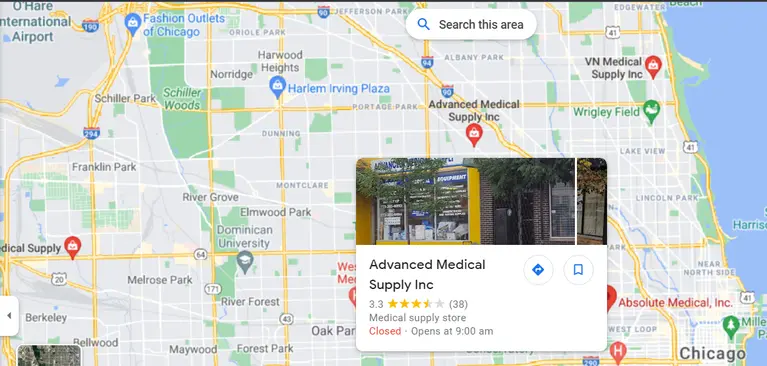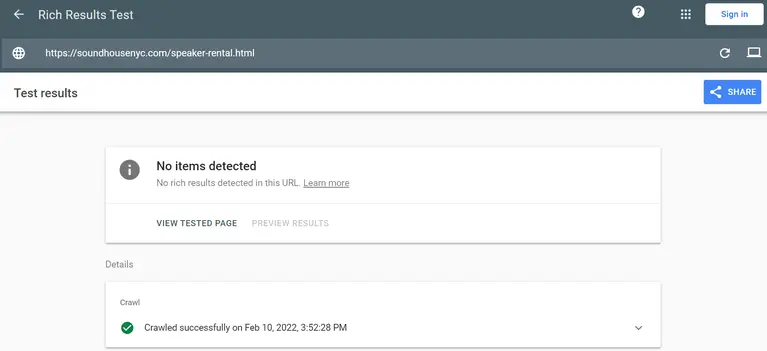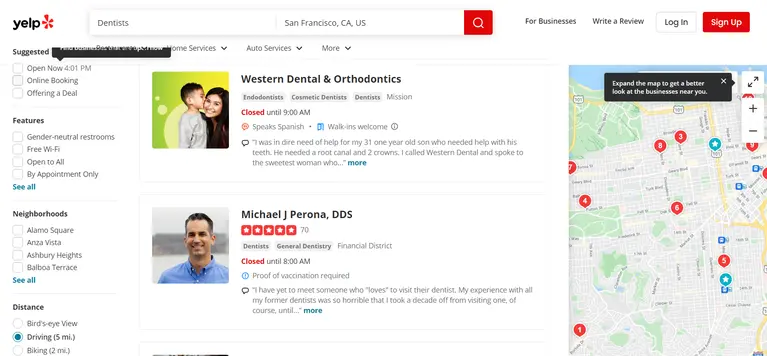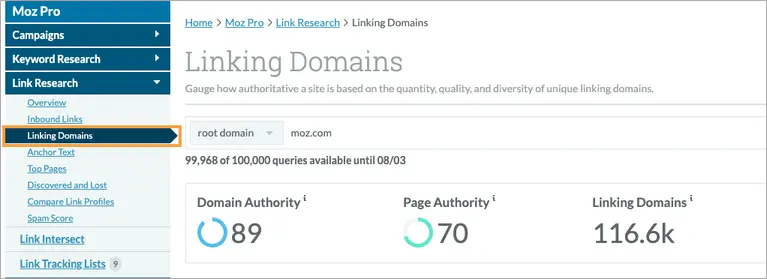
Why is Local SEO Important for Enterprise Level Companies?
When talking about Local SEO, most advice you find on the Internet is often limited to small and medium-sized businesses.
Unlike small businesses with one or two locations where a single person could handle local SEO, enterprises face a whole new set of complexities. E.g., numerous business locations, large teams, multiple countries' presences.
Let's look at how enterprises can solve local SEO issues and improve local search ranking on search engines.
9 Tips to Use Local SEO for Enterprise Companies
1. Ensuring Guidelines Compliance
You will have too many local listings and pages to manage as an enterprise, but that's not an excuse to break the rules. Follow Google's Guidelines for Representing Your Business on Google to avoid breaking the rules and getting banned from local search results.
Here are a few tips to follow to ensure you are compliant.
- Each location you mentioned is a genuine physical location and not a PO box or virtual office and conducts face-to-face business with consumers.
- Maintain NAP consistency to avoid misleading customers. Meaning the business name, address, and phone number are consistent across all the listings.
- Ensure you do not have duplicate listings. Duplicate listings can break not only guidelines but also mislead users. As a result, each location should have only one listing.
Here’s an example of duplicate listings:

2. Setting Up Store Locator
Want to drive online shoppers through the door of your brand store?
If yes, then store locators are your best friends. A well-designed store locator can help your customers easily find and visit your local store.
This is one feature that many enterprise brands underestimate entirely. And even if they have the store locator, it is often limited to a search box on their website. Customers are left to fend for themselves.
Here are some tips for implementing store locators for Enterprise local SEO effectively:
- Designed For Both SEO And Users: Your store locator should be designed for both humans and search engines for maximum visibility and usability. The locators must be crawlable. Otherwise, they will severely hinder visibility.
- Show Result Based On User Location: This type of locator detects users' location using the geolocation feature of the browsers to show the nearest store to them. It also provides accurate results.
- Supports Third-Party Apps For Directions: Ensure that your store locator supports apps like Apple Maps or Google Maps to help your customers find the way to the store.
Here’s an example of a store locator:

3. Developing A Clear Strategy For Reviews
Whether you believe it or not, reviews can make a huge difference for your enterprise.
Reviews account for 13% of how Google decides to rank businesses.
Almost 93% of consumers say they depend on online reviews to buy the products.
Another survey reports that customers are willing to spend 31% more on businesses with positive reviews.
These tips will help you develop a clear strategy for collecting and managing reviews:
- Google provides a unique link to get customers' reviews on your Google listings. Link them to your store locator pages, or give customers these links when they buy.
- Monitor your review performance at every location to identify where you need to improve.
- Utilize tools such as sentiment analysis to identify trends in reviews and better understand what your customers are saying. This helps you identify potentially brand-damaging things early on and correct them before they lead to a catastrophe.
Brand24 is a powerful tool to analyze the sentiments of your business’s reviews:

Read: 10 Tips to Get Local Reviews for Your Business
4. Improve On-Page Local SEO
A website is a critical part of local SEO that, unfortunately, many enterprises choose to ignore.
Here are a few tips for Enterprise brands to make full use of websites for local SEO purposes.
- Create a local content plan for all the locations. A website without local content is just an ordinary website. Local content like local community events major announcements can be incorporated directly on the store page or in the form of blog posts.
- Ensure all your store pages are indexed by search engines and display critical elements like phone numbers.
- Implement a local schema markup for all the store locator pages.
You can implement local store schema markups from schema.org

5. Rise In Hyper Localization
The biggest mistake enterprises make when doing local SEO is thinking nationally. Insensitivity and a failure to research customers' needs with the intention of satisfying them is one of the most common causes why large brands fail at the local level.
It's time for enterprise brands to rethink their local strategy from ignored negative reviews across food brands franchises to the downsizing of apparel retail outlets.
Hyperlocalization is on the rise. Consumers want brands to understand their feelings. You have to understand them before you can engage them.
Here Are Some Tips For Your Enterprise Business To Get Achieve Hyper Localization:
- Creating an area profile before opening up a business in a new location. It includes understanding the demand, the population, the local news, the shopping behavior, etc.
- Engage with the community. There is no alternate way. Sponsor events, help small businesses, and so much more.
- Be sensitive to regional needs. To be accepted as a local brand, you have to be one.
Social media platforms are great places to engage with your local audience:

6. Structured Data Is Your Friend
While structured data might appear more technical, it is the secret that helps many enterprise brands dominate local searches.
Structured data is data at a high level of organization. In SEO terms, structured data is used to implement data representing the Schema.org initiative. The Schema initiative was founded in 2011, with the collaborative effort of Google and Yahoo.
A major benefit of structured data is that it will enable search engines to organize and display your site's content more creatively. The better the search engine understands your data, the higher your ranking.
Things To Keep In Mind Before Adding Schema Markup To Your Website:
- Check your site using Google's Structured Data Testing Tool.
- Follow Google's structured data guidelines to avoid issues down the road
- Always ensure that your schema makeup aligns with the user's page intent.
Here’s a screenshot of a Rich Results Test from the structured data testing tool:

7. Nailing Your Google My Business Listings
Google My Business listings are an essential part of local enterprise SEO. The customers who find your business through GMB listing are 50% more likely to buy from you.
Following Are Some Tips On How To Improve Your GMB Listings:
- Fill in all the information about your business, including address, name, hours of operation, category, description, and others.
- Use tools like getting Five Stars or Moz Local. These are enterprise-friendly tools and enable listing managers to receive notifications whenever there is activity on GMB listings. E.g., new reviews from customers.
- Every brand will have to deal with spam at some point. Most spam is caused by keyword stuffing. Thus, keep your business spam-free by reporting spam on Google Maps regularly.
- Use optional but helpful features like Google posts and QA to increase user engagement. Make sure all posts are consistent across listings.
Here’s an example of a Google post by a business owner:

Read: Common Google My Business Mistakes People Make
8. Managing Citations And Local Link Building
It's no secret that link building has a massive impact on your website's ranking. It might be daunting to engage in local link building due to the sheer volume of locations. But, local links are an important part of local enterprise SEO.
Here are some tips for managing local link building and citations:
- Use Yext or Moz Local tools to create and optimize listings for multiple locations. These tools are perfect for brands with 100 plus locations. They help push citations, remove duplicate data, etc.
- Create citations on industry-specific platforms—for example, TripAdvisor, Yelp, etc., for more link-building opportunities.
- Set up an inventory of all the PR events and ensure you get the link back. You can also get links by sponsoring events, supporting small businesses, hosting networking events, etc.
Here’s an example of citations on Yelp.com

9. Assessing Your Competitors
A survey reports that 90% of customers refuse to drive more than 15 minutes for regular purchases. This means that many of your competitors will be within 15 minutes' driving distance of your customers.
That's why you should know who your competitors are. By knowing this, you can make sensible decisions about where to locate your brand and make changes to be competitive.
Here's how to assess your local competitors as an enterprise business:
- Perform Research Population: Every location will have its population and buying cycle. Identify these buying trends and start your campaigns around these trends and seasons.
- Assess The Budget Level: It doesn't matter how well you perform your marketing; if the local population cannot afford your products, they will not buy them. In other words, you do not want to sell motorcycles to people interested in sweaters.
- Use tools like Moz Local, Bright Local, Yext to know your competitors' linking strategy, keyword, and content strategy.
Here’s a screenshot of Moz local analyzing a competitor’s backlinks using its link research tool:

Read: Tips to Do Competitor Analysis in SEO
Key Takeaways:
- Ensure you have a store locator on your brand's website to help customers find a local store easily.
- Make sure you follow all the compliance guidelines to avoid getting a penalty.
- Develop a strategy to help you generate honest reviews from customers.
- Optimize your Google My Business listing to avoid missing leads.
- Assess your competitor's strategy using tools like Bright Local, Moz Local, etc.
- Build hyperlocal campaigns to connect with local audiences on a deeper level.
- Improve On-page SEO by creating local content and using schema markup.
ABOUT THE AUTHOR:
Brice Decker

Brice has been handling marketing projects for more than 12 years and he is providing consulting services on SEO, Social Media and PPC. He has a huge expertise in working at large corporations including Accenture Interactive & PwC Digital Services.
Related Post
Local SEO for Multiple Locations
Local SEO for Appliance Repair Companies
Local SEO for Pest Control Firms
Local SEO for Nonprofit Organizations
Local SEO for Roofing Contractors
Local SEO for Auto Repair Shops
Local SEO for Landscaping Companies
Local SEO for Personal Trainers
Local SEO for Ecommerce Websites
Local SEO for Asphalt Paving Contractors
Local SEO for Small Businesses
ABOUT THE AUTHOR:
Brice Decker

Brice has been handling marketing projects for more than 12 years and he is providing consulting services on SEO, Social Media and PPC. He has a huge expertise in working at large corporations including Accenture Interactive & PwC Digital Services.
Related Post
Local SEO for Multiple Locations
Local SEO for Appliance Repair Companies
Local SEO for Pest Control Firms
Local SEO for Nonprofit Organizations
Local SEO for Roofing Contractors
Local SEO for Auto Repair Shops
Local SEO for Landscaping Companies
Local SEO for Personal Trainers
Local SEO for Ecommerce Websites
Local SEO for Asphalt Paving Contractors
Local SEO for Small Businesses